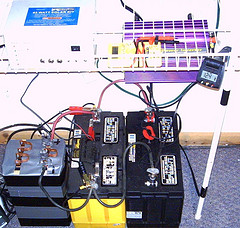 Community Colleges teach many skills needed for green tech. Some like Skyline are bundling these courses into a certificate program. Students in these programs learn by doing. Obama’s stimulus package will encourage more campuses to create more interesting and versatile green technology programs. Your enthusiasm for these programs will make a difference.
Community Colleges teach many skills needed for green tech. Some like Skyline are bundling these courses into a certificate program. Students in these programs learn by doing. Obama’s stimulus package will encourage more campuses to create more interesting and versatile green technology programs. Your enthusiasm for these programs will make a difference.
Skyline Community College in Marin, California is offering a course in solar voltaic installations. Students earn certificates while working in the field encountering real problems. They master skills and concepts in both electrical and construction technology.
The Los Angeles Community College District has created a sustainable energy curriculum, which integrates construction and electrical technology with chemistry, engineering and physics. The goal is to remove their nine campuses from the grid.
The LACCs will teach students to install solar panels that will produce 1-megawatt at each of its campuses. This is sufficient power for the daytime load and enough to produce hydrogen gas by electrolyses for full cells to power the night load.
The faculties and their advisors at many community colleges are designing and experimenting with many interdisciplinary courses that will combine courses as electric motors with electric cars, business management with sustainable environments, and computer science with power management.
While no one knows the precise future of green technology, we know the skills that are needed are transferable to other fields. For example, concepts needed to work with electric motors are similar to those needed for generators. Student understanding these concepts can apply them to wind turbines, electric car motors or regenative breaking. Solid rooting in fundamentals can greatly reduce specific training time.
Often workers with advanced degrees and experience come to community colleges to update their knowledge. Experienced workers in a class are an inspiration to those aspiring to enter the field. They demonstrate to the rest of the class that fundamental skills empower the learning of new skills, and these skills are marketable.
Community colleges offer greater flexibility than any other educational institution. Learning experience ranges from fundamentals to specifics, university transferable courses to hands-on site training.
Community colleges can work with trade association and labor unions to facilitate training for apprentices and continuing education for journeymen. They are able to work with public and private institutions to offer general or special classes. Industry can open its facilities to community colleges and receive state paid instruction as long as they open their doors to the public.
The International Brotherhood of Electrical Workers (IBEW) is a good example of a union program that works with community colleges to trains new member in the electrical trades and updates its member’s skill in many fields such as solar panel instillation.
To learn more, contact your local community college. Share your enthusiasm with them. Discover the programs they have or are planning. Your interest may stimulate curriculum development. Get the word out to your friends and neighbors. If you or a friend wants to start a career in green technology or update their skills, take and encourage these green tech courses.
Photo Credit:Flickr/ M. Barkley





